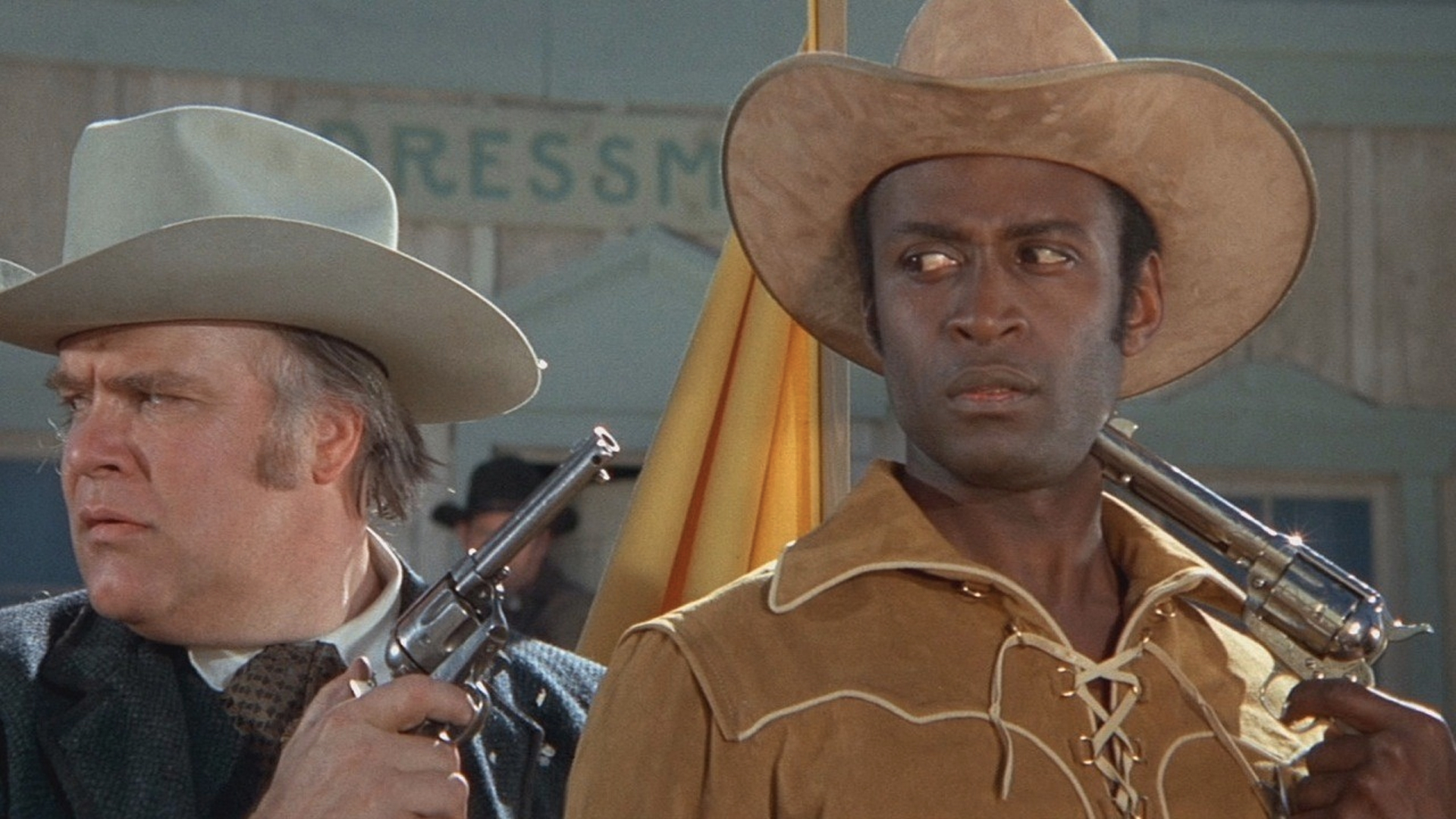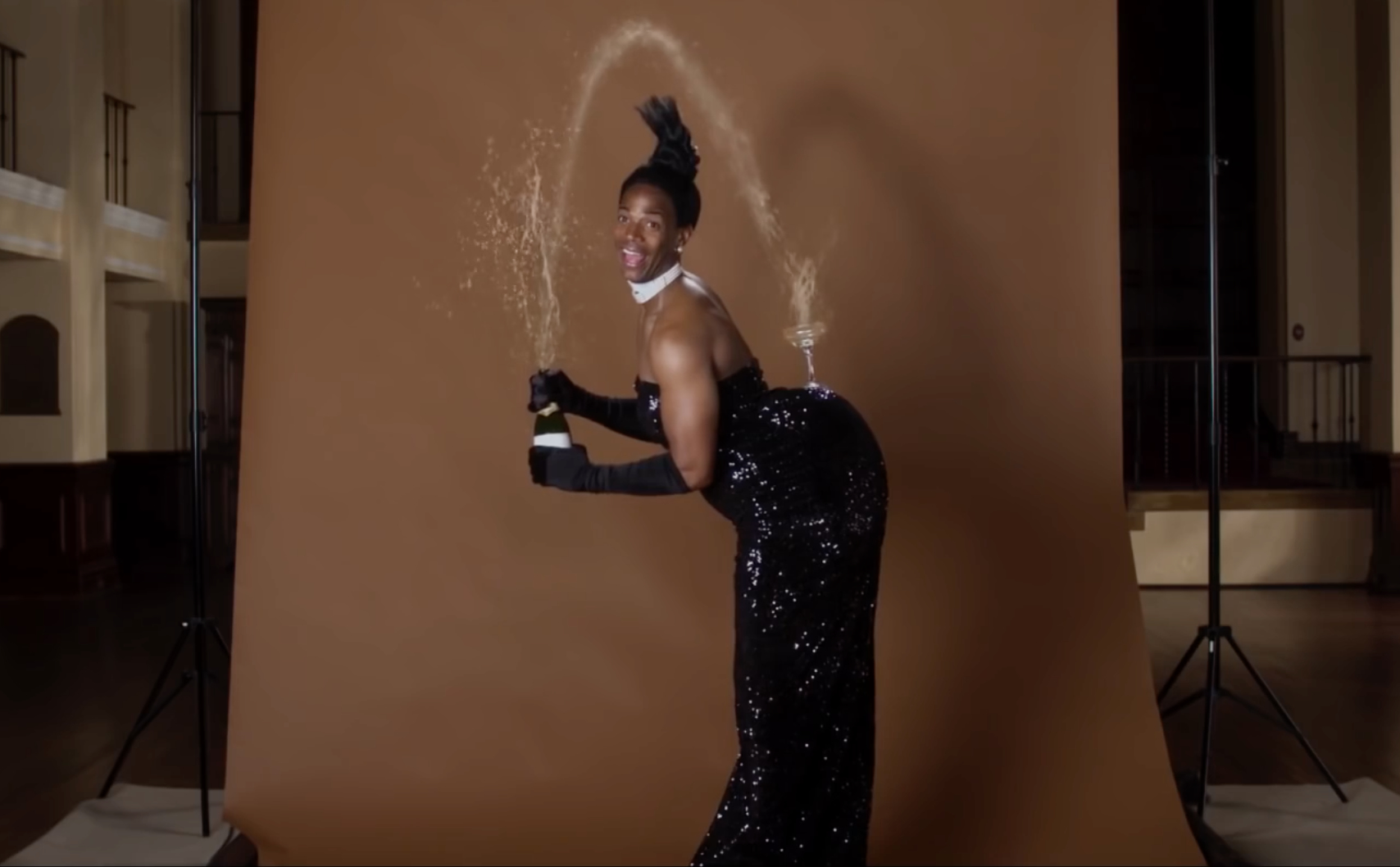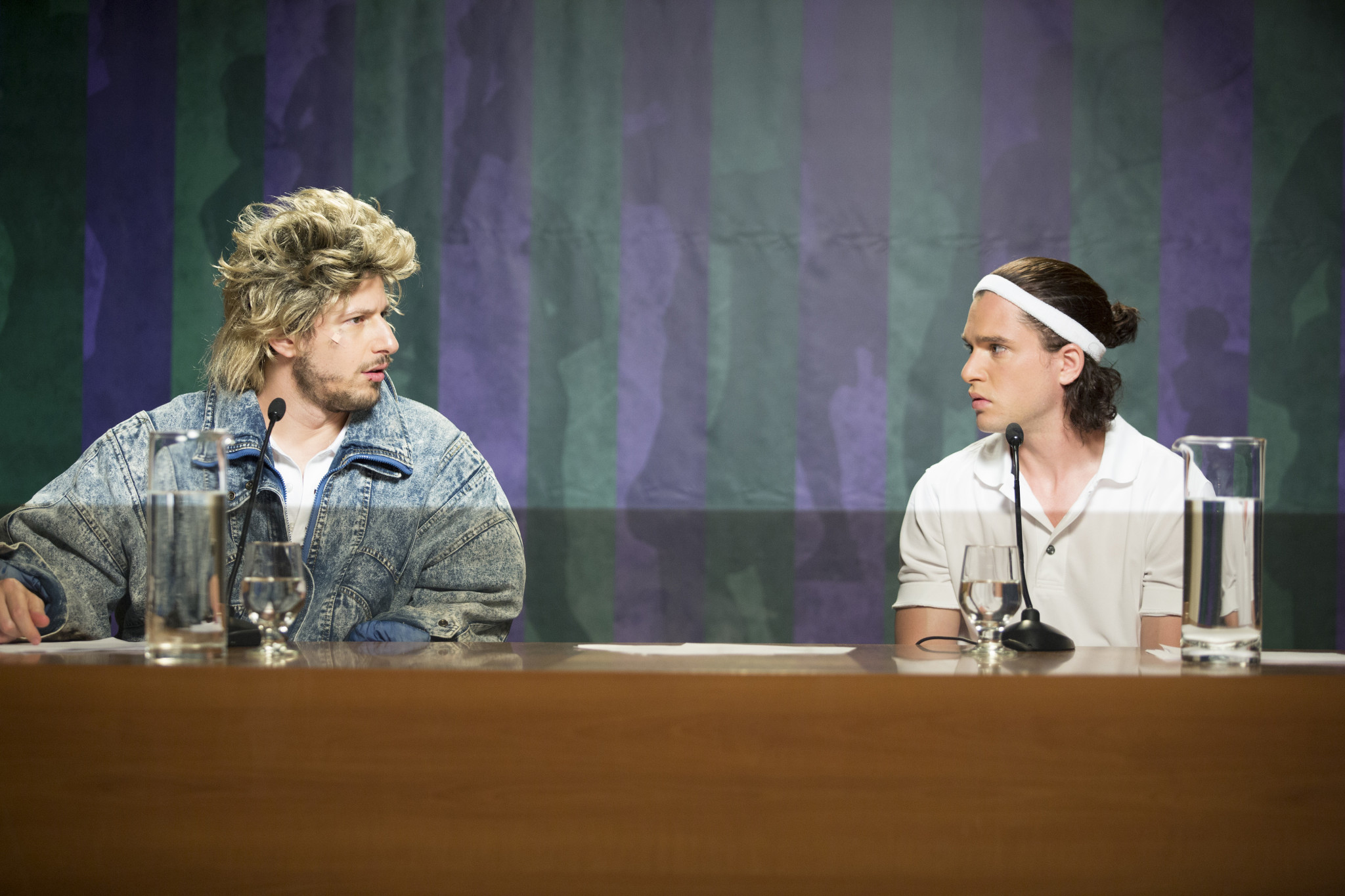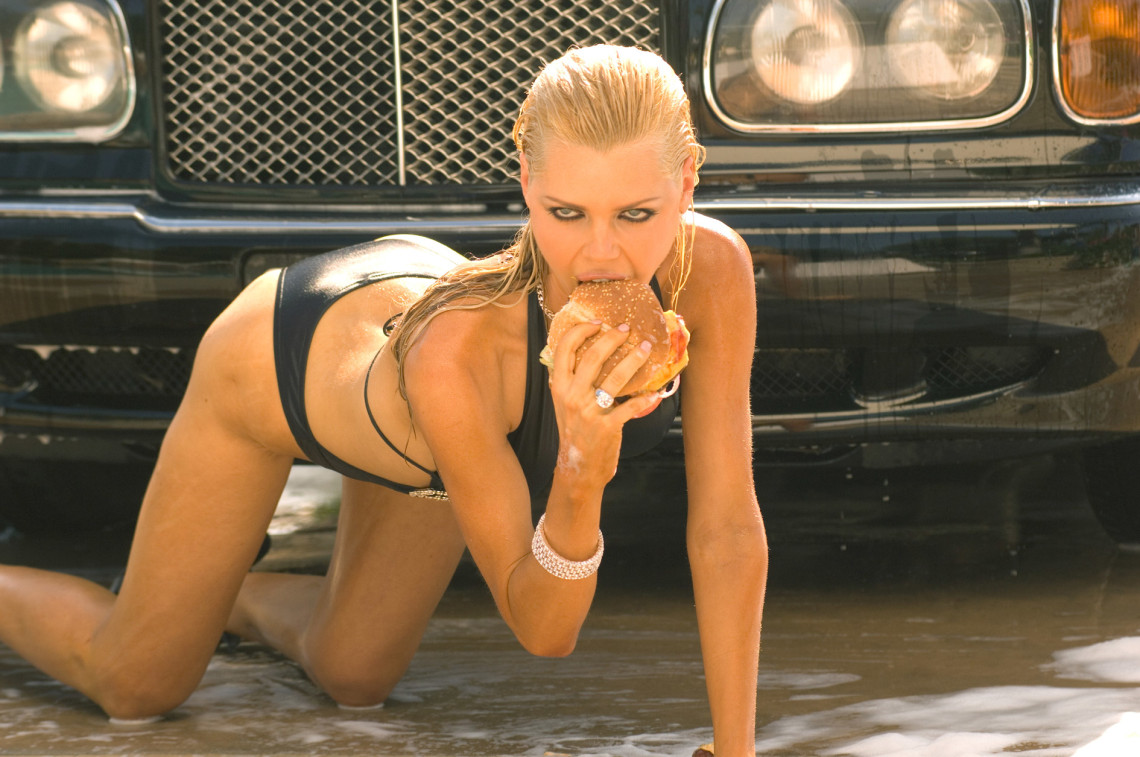As America continues to lay waste to the environment, widen the massive financial pit that threatens to consume the country’s economy, and dig our military heels into more overseas quagmires than can be numbered on a single hand, a crisis no less urgent faces this fine nation. We’ve been depleting our strategic reserves of parody-based comedy films at a troubling rate in the past couple of decades, to the point where this precious entertainment resource approaches the point of total collapse. Whereas America once enjoyed robust production of films deriving humor from silly allusions to or long-form spoofs of existing genres or specific works, Hollywood has flagged in their distribution of this specific strain of comedy in recent years, and what’s more, they’ve worsened in their remaining efforts.
Consider 1980’s Airplane! to be Point A of the send-up genre, and this weekend’s Fifty Shades of Black to be Point B. The line connecting these points is long, sad, occasionally baffling, and it wends its way through some astonishingly awful films. But tracing it reveals a dire state of affairs for a once-august comedy tradition, and if a sea change isn’t enacted soon, the next generation may very well grow up without the privilege of seeing their favorite films lovingly lampooned by folks who share in their passion. That’s not a world anyone should have to live in.

It wasn’t too long ago that parody was a perfectly reputable mode of humor to operate within, an umbrella collecting some wonderfully witty cinematic caricatures. Airplane! remains the high-water mark of the genre, encapsulating everything that makes the subgenre so endearing while working as an inspired creation unto itself. Plenty of films took satirical aim at familiar targets prior to the David Zucker-Jim Abrahams-Jerry Zucker brain trust’s magnum opus: Mel Brooks’ Blazing Saddles was a Western spoof as roaringly un-PC as the films in which it found inspiration, a baby-faced Woody Allen made one of his first film appearances in the spy parody Casino Royale (now doomed to an eternity of being referred to as “no, the other Casino Royale”), and Murder by Death was a takeoff on the whodunit complete with off-brand versions of Sam Spade and Hercule Poirot. And all of the aforementioned films kept things entertaining by cramming every scene with so many absurd throwaway gags that any dead air is instantaneously resuscitated.
More crucially, however, these films are still remembered fondly due to the specificity of their parody. Airplane! imitates 1957’s Zero Hour! down to some extremely fine details, with samples of the original film’s script appearing in its spoof verbatim. The Zucker-Abrahams-Zucker team faithfully emulate the tone of overblown crisis endemic to the “disaster movies” that enjoyed popularity a couple decades before, teasing out the comedy that was always laying dormant in lines like “Our survival hinges on one thing — finding someone who not only can fly this plane, but didn’t have fish for dinner.” 1988’s wonderfully named I’m Gonna Git You Sucka nails the little particulars of the blaxploitation films that it acknowledges with a thumbed-nose salute. Beyond the easy potshots of neighborhood dudes fatally overdosing on gold chains, the film replicates the minor touches that make up the genre’s signature feel, from the soulful funk music on the soundtrack to the erratic camerawork resulting from autodidact cinematographers. The soul of a parody hinges entirely on the extent to which it feels like the real deal. The best satire, it’s said, is indistinguishable from straight-faced seriousness.
In recent years, the spoof form has suffered due to a widespread lack of that same specificity. In the films that have become the face of this comedic tradition, lowest-common-denominator pop-culture references take the place of jokes, and gratuitous raunch takes the place of zany cleverness. The vulgar usurpers of the Zucker-Abrahams-Zucker throne are the team of Jason Friedberg and Aaron Seltzer, having launched their first offensive as the writers of Scary Movie (along with I’m Gonna Git You Sucka director Keenen Ivory Wayans, who has apparently united with his brother Marlon, director of Fifty Shades Of Black, in a vast conspiracy to destroy what little legitimacy this genre has left) before expanding their influence to the whole of moviedom. Like Genghis Khan seizing huge swaths of Asia and leaving only a trail of bastard children behind, Friedberg and Seltzer moved onto romcoms with Date Movie and popcorn blockbusters the next year with Epic Movie, both of which have at best passing interests in the genres they’re supposed to be spoofing.

Their fundamental indifference to in-depth genre mimicry became apparent in their later films, hodgepodges of in-your-face toilet humor and pop-culture softballs with titles like The Starving Games and Superfast! The former of those two films, as the sort-of-a-pun title might suggest, presents itself as a parody of the world-straddling Hunger Games films that launched Jennifer Lawrence to megastardom. And there’s plenty to be mocked in these films—how our heroine manages to stay telegenic despite living in the bombed-out remains of an impoverished society, or the core absurdity of a televised game show in which children murder each other. Instead, the film takes aim at other, more far-flung targets. For example, who should appear to perform at the Starving Games’ opening ceremonies but the members of LMFAO! How they ended up in this fictitious world doesn’t matter, they’re going to be killed by land mines in mere moments. All that matters is that the audience recognize them, and quietly chuckle without realizing that nothing funny has taken place.
Not to mention the dark depths that lay within the ring of Hell reserved for Friedberg and Seltzer. If they’re the poor man’s Zucker-Abrahams-Zucker, then the poor man’s Friedberg-Seltzer would have to be Craig Moss, the singular auteur behind such fine films as The 41-Year-Old Virgin Who Knocked Up Sarah Marshall and Felt Superbad About It and 30 Nights of Paranormal Activity with the Devil Inside the Girl with the Dragon Tattoo. Or perhaps Bob Saget, one-time face of wholesome family entertainment, and now the director-writer-star of Farce of the Penguins, an unmentionably filthy send-up of a certain popular nature documentary. These films are shambolic wrecks, barely existent, with no regard for story, character, or even basic logic. (Why do the penguins spend so much time talking about their huge dicks when penguins don’t even have penises? They have cloacas! Cloacas!) But because this model has remained largely profitable—these movies can be produced on the cheap, and brand recognition alone is usually enough to guarantee a profit, though recent years have dealt the Friedberg-Seltzer camp a pair of major flops—studios continue to stoke the flame.

Even more worrisome is the trouble that the actually competent parody films have had with connecting to an audience. Spoofs only read with viewers familiar with the genre, and so they’re necessarily a niche entertainment and as such, a risky endeavor for a studio. The past decade has seen parody thrive on the niche-friendly expanses of TV, where oddball projects like the 30 for 30 spoof 7 Days In Hell and the tone-perfect Lifetime Original Movie parody A Deadly Adoption have met with concentrated but vocal approval. But studios who have rolled the dice on parodies with Airplane!’s obsessive attention to detail have lived to regret it. 2014’s They Came Together skewered the many clichés of the boy-meets-girl romcom with razor-sharp fidelity, but then collapsed at the box office, even with the friendly faces of Amy Poehler and Paul Rudd out in front. While lukewarm reviews didn’t help, the fact that fully appreciating the film required a familiarity with You’ve Got Mail turned off many viewers.
All of this leaves Hollywood in a bleak position moving forward. On one side, barbarians bang on the gate, wielding unfunny jokes and unwieldy titles. On the other is a paradigm that damns substantial films as too good to be profitable. It’s a troubling impasse, but one that absolutely must be progressed beyond. Because the recent waves of soulless parodies have lost sight of the crucial element that makes the form so enjoyable in the first place: a genuine affection for the material being lampooned. All the best parodies play like love letters, their comical jabs always rooted in a deep and abiding appreciation for that which has come before. Hours of faithful study give filmmakers the intimate knowledge of the source material required to understand what makes it tick, and so the comedy must necessarily come from a place of love. The real offense from Friedberg, Seltzer and the rest of the bottomfeeders isn’t mere bad filmmaking. They just don’t give a shit. Hollywood deserves better, the annals of pop culture deserve better, and the American people deserve better.


















4 thoughts on “Spoofing Off: The Death of American Parody Film”
Correction, the first spoof Friedberg/Seltzer are involved was Spy Hard in 1996 that spoofed spy movies starring Leslie Nielsen. Terrible film.
FIFTY SHADES OF BLACK just got released at the wrong time,otherwise we wouldn’t be seeing this very article. And plus,all of those latter post-EPIC MOVIE films and various TWILIGHT spoofs didn’t help heighten the concept of the spoof subgenre.
On the small screen TBS’ ANGIE TRIBECA ineptly tries to revive THE NAKED GUN formula whilst also liberally stealing from both POLICE SQUAD! and SLEDGE HAMMER! minus their exclamation marks. What appears to be missing is satire versus these emptyheaded farces that randomly choose targets and have the feel of overextended YouTube videos.
Blaxploitation also had a spoof called Black Dynamite.